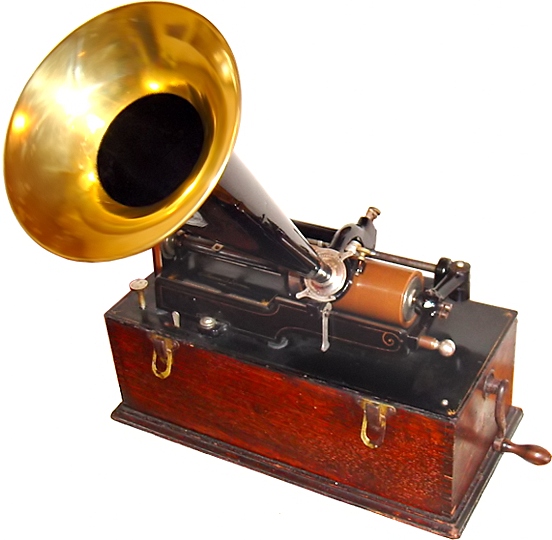Tin-type camera was patented by Hamilton Smith of Gambier, Ohio, in 1856. Idea: Children could learn how the tin-type was different from other kinds of cameras.

Gramophone
Gramophone, later called the phonograph, was patented by Thomas Edison in 1878. He received patent number 200,521. Older children could learn more about the history of sound recording at: Gramophone.
President Roosevelt ordered the internment of about 110,000 Japanese-Americans in 1942. They were sent to concentration camps in western states. They lost their property, valued at about four hundred million dollars. Children could find out more about the reasons behind Roosevelt’s decision. What was life like in the concentration camps? They could learn more at: Japanese Relocation. Students might also read Farewell to Manzanar by Jeane W. Houston and James D. Houston.
Nicolaus Copernicus (born Torun, Poland, 1473; died Fromborck, Poland, May 24, 1543) was an astronomer and priest. He caused great upheaval among authorities when he proposed that the sun and not the earth was the center of our planetary arrangement. Children could learn more at: Copernicus.
Jeff Kinney (born Fort Washington, Maryland, 1971) is a cartoonist, game designer, and author of children’s books. He writes the Diary of a Wimpy Kid series. Children can visit his website at: http://www.wimpykid.com/.
Louis Slobodkin (born Albany, New York, 1903; died Miami Beach, Florida, May 8, 1975) was a sculptor, writer, and illustrator. He wrote and illustrated over 20 books. He and his wife, Florence, collaborated on five more books. In addition, he illustrated books by other authors, including Eleanor Estes and Mabel Leigh Hunt. He received the 1944 Caldecott Medal for his illustrations of Many Moons, written by James Thurber. Children can learn more at: Louis Slobodkin.
National Muffin Day is today! An English muffin is very different from an American muffin, but both are mighty tasty! Idea: Children could list all the types of muffins they can think of and then decide on their favorite.
Frederick Douglass died in Anacostia Heights, DC, in 1895. He was born in Tuckahoe, Maryland, probably in February 1818. He escaped from slavery and became a popular abolitionist and speaker. Children can learn more at Frederick Douglass. Children can also read some of his works at Project Gutenberg.

John Glenn
John Glenn in 1962 was the first American and the third person to orbit the earth. He circled the earth in Friendship 7 three times in almost five hours.
At the age of 77, he returned to space on the space shuttle Discovery, when he participated in scientific experiments from October 29 to November 7, 1998. He was at that time the oldest person to venture into space. Children could learn more at: John Glenn.

Mir Space Station
Mir space station was launched by the Soviet Union in 1986. It was home to both Soviet and American scientists until March, 2001.
Ansel Adams (born San Francisco, California, 1902; died Monterey, California, April 22, 1984) was a very famous photographer. He was commissioned by the National Park Service in 1941 to photograph nature. Children can view many of these photographs at: Ansel Adams.
Richard Matheson (born Allendale, New Jersey, 1926; died Los Angeles, California, June 23, 2013) wrote science fiction books. His works include I am Legend and Other Kingdoms.
William Prescott (born Groton, Massachusetts, 1726; died Pepperell, Massachusetts, October 13, 1795) was a Revolutionary War hero. He was fighting at the Battle of Bunker Hill on June 17, 1775, when he stated, “Don’t fire until you see the whites of their eyes.”
The Cherokee Phoenix, published on a weekly basis in Georgia, became in 1828 the first Native American newspaper. It stopped publication in 1834, but today an electronic version is still being published.